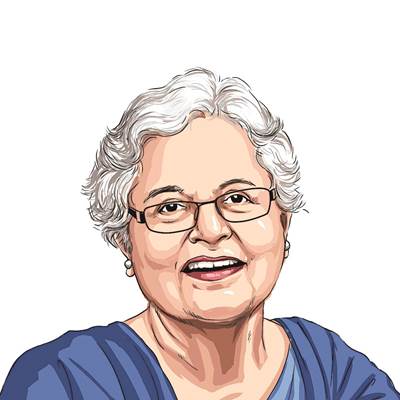Opinion Inside Track: Dogged Activity
Bombay’s first riot was in 1832, when a mob of 200, mostly Parsis, attacked policemen who were trying to round up strays. The community has special affection for the canine breed and even includes a dog in its funerary rites.
 In a way, the wheel has turned full circle in the confrontation between stray dog lovers and the authorities.
In a way, the wheel has turned full circle in the confrontation between stray dog lovers and the authorities. In a way, the wheel has turned full circle in the confrontation between stray dog lovers and the authorities. Bombay’s first riot was in 1832, when a mob of 200, mostly Parsis, attacked policemen who were trying to round up strays. The community has special affection for the canine breed and even includes a dog in its funerary rites.
Many Parsis were shocked to discover that one from their own community, SC’s Justice Jamshed Burjor Pardiwala, had ordered the rounding up all strays in Delhi-NCR. He is being unfairly targeted by animal activists, including Parsis, for what is dubbed an unrealistic order. But the judges would perhaps not have called for such extreme measures if activists over the years had not been emboldened to mindlessly oppose every effort to bring rationality in the adherence to Animal Welfare Board (AWB) rules and control the canine population. In their zeal, the activists have misused the court and police to terrorise citizens from undertaking even minor reforms, such as permitting the municipality to remove biting dogs from colonies, questioning the sterilisation methods thus securing endless stays from the court, fudging figures of strays and defying AWB feeding rules by placing feeding bowls wherever they chose, usually on outer roads and in front of houses. In my own Nizamuddin East colony, a decade ago, the lawyer husband of an activist filed police cases against all members of the RWA, which served as a chilling warning to all subsequent welfare associations.
Complete Opposite
C P Radhakrishnan, the ruling party’s choice for Vice President, is the complete opposite of Jagdeep Dhankhar. The soft spoken, two-time MP from Tamil Nadu is self effacing, with simple habits and is a staunch party loyalist. Unlike Dhankhar, who has a legal background, Radhakrishnan may have difficulty controlling the feisty Opposition in the Upper House, where the BJP has a slender majority. He may rely heavily on deputy chairperson Harivansh Narayan Singh, a JD(U) MP, for advice in running the Upper House. Incidentally, Harivansh’s term ends in September next year and NDA allies are keen for an appointment of their choice. My own surmise, which admittedly has few takers, is that Dhankhar, the archetypal acolyte, only developed teeth and started hobnobbing with the Opposition after the BJP indicated to him that he might have to step down before the completion of his term in view of mounting pressure from allies after the Lok Sabha results.
Dynastic Dilemma
As a fourth generation political dynast, Mahanaaryaman Scindia — great-grandson of Rajmata Vijaya Raje Scindia and son of Communications Minister Jyotiraditya Scindia — should have an easy entry into politics. But though the erstwhile royal family still exercises enormous clout in the parliamentary seats of Gwalior, Shivpuri and Guna in Madhya Pradesh, it is handicapped because too many family members have political aspirations, while the BJP generally frowns on political dynasties. Apart from his father, Mahanaaryaman’s cousin Dushyant is a Rajasthan MP and estranged aunts Vasundhara Raje and Yashodhara Scindia were till recently active politicians. Yashodhara’s son, Akshay Bhansali, once talked about a political career, but subsequently abandoned the idea. Jyotiraditya has obviously decided the best way for his son’s political future lies through cricket, as the two spheres are closely associated. Mahanaaryaman, 29, the vice president of the Gwalior division of the cricket association and also chairperson of the MP cricket league, hopes to be elected unopposed as president of the state cricket association.
People over Politicos
Rao Inderjit Singh is a political heavyweight, minister of state and five-time Lok Sabha MP presently representing Gurugram. Yet, his word seems to count for little with the Haryana authorities. Before the monsoons, Singh repeatedly warned the corporation to rectify the outdated drainage system, but evoked little response from those in charge of the largely rural state. But when the heavy monsoons created havoc in the financial and IT hub, with even the super rich in their high rise complexes and golf courses not spared, influencers like Suhel Seth launched a very effective citizens campaign through social media and the newspapers. In Chandigarh, CM Nayab Singh Saini was finally jolted into action. The Haryana chief secretary and the CM’s principal secretary rushed to Gurugram, where they have spent the last week holding marathon meetings, granting sanctions and extensions needed to strengthen basic services. The municipal commissioner is finally responding to videos of dysfunctional services posted by irate residents. If Singh was handicapped in getting his own party to act in time, it is partly because he began his political career in the Congress. Though he switched to the BJP in 2014, he has yet to forge close links with the ruling party’s Haryana cadre, especially Saini, who is much junior to him.



